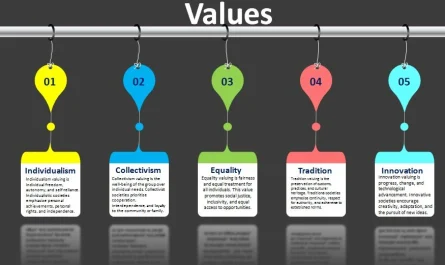The Metaverse: What is it and How Will it Change the World?
Introduction
The metaverse is a hypothesized iteration of the internet as a single, universal and immersive virtual world that is facilitated by the use of virtual reality and augmented reality headsets. It is often described as a successor to the internet, and it has the potential to revolutionize the way we interact with the digital world.
The metaverse is still in its early stages of development, but it has the potential to change the world in many ways. For example, it could be used to improve remote work, education, and healthcare. It could also be used to create new forms of entertainment and social interaction.
Definition of the Metaverse
The Metaverse represents a networked virtual reality realm enabling users to engage with computer-generated surroundings and interact with fellow users through avatars. This digital universe harmoniously blends aspects of the physical world and the digital domain, granting access to immersive and interactive experiences.
Brief history of the Metaverse
The origins of the Metaverse concept can be traced back to science fiction literature, most notably Neal Stephenson’s 1992 novel “Snow Crash,” in which he introduced the idea of a virtual reality-based world known as the “Metaverse.” This literary creation sparked fascination among technologists, leading to numerous iterations and interpretations of the concept over the years.
Here’s a brief history of the Metaverse concept and its development:
Science Fiction Origins:
The term “Metaverse” was introduced by Neal Stephenson in his 1992 science fiction novel “Snow Crash.” Within the pages of the book, the Metaverse emerges as an expansive virtual reality realm envisioned as the internet’s successor, where users navigate and interact with one another through avatars.
Early Virtual Worlds and Games:
Before the widespread adoption of the term “Metaverse,” several early virtual worlds and video games played a pivotal role in shaping the idea. For instance, “Second Life,” which was introduced in 2003, enabled users to fashion avatars, socialize, construct virtual properties, and engage in the trade of virtual goods.
Rise of Virtual Reality (VR):
The renewed fascination with virtual reality (VR) during the 2010s rekindled conversations surrounding the Metaverse. The advancements in VR headsets and technology ushered in more immersive virtual experiences, bridging the gap between the concept and actuality.
Blockchain and Decentralization Influence:
The advent of blockchain technology and the ascent of cryptocurrencies also contributed to the evolution of the Metaverse concept. The decentralized nature of blockchain and its principles of digital asset ownership became pertinent topics in discussions concerning virtual worlds.
Big Tech and Metaverse Vision:
In recent times, prominent tech companies and influential figures have shared their vision for the Metaverse. Entities such as Facebook (now Meta), Microsoft, and others have underlined their dedication to constructing the Metaverse and investing in Virtual Reality (VR) and Augmented Reality (AR) technologies.
Development of Virtual Reality Platforms:
The progress in Virtual Reality (VR) and Augmented Reality (AR) technologies has paved the way for several platforms that facilitate Metaverse-like encounters. These platforms provide opportunities for social interactions, digital economies, and lasting virtual environments.
The Ongoing Evolution:
As of my last update in September 2021, the Metaverse is still a work in progress, with developers, entrepreneurs, and innovators actively exploring the potential and challenges of creating a fully realized version.
The future of the Metaverse holds promise and remains full of possibilities. As technology continues to advance, we can anticipate further breakthroughs in virtual reality, augmented reality, blockchain, and other supporting technologies. As these technologies converge, the realization of a comprehensive and interconnected Metaverse becomes increasingly achievable.
Nevertheless, it is crucial to address concerns surrounding privacy, security, digital ownership, and inclusivity to ensure that the Metaverse can have a positive impact on the world. By addressing these issues, we can foster an environment where the Metaverse can thrive and contribute to a better digital future.
Significance of the Metaverse in today's technological landscape
Amidst today’s swiftly evolving technological landscape, the Metaverse assumes paramount importance. It signifies the harmonious merging of virtual reality, artificial intelligence, and other state-of-the-art technologies, presenting novel avenues for connectivity, learning, exploration, and business transactions in an ever-expanding digital realm.
Virtual reality vs. the Metaverse
Whereas virtual reality (VR) offers immersive experiences that immerse users in simulated environments, the Metaverse takes this idea further by connecting various virtual worlds. It represents a more extensive and interconnected digital realm, allowing users to seamlessly explore a wide array of virtual environments.
Key elements and components of the Metaverse
1. Virtual worlds and environments:
Within the Metaverse, there exists a myriad of virtual worlds and environments, awaiting exploration by users, each showcasing its distinctive characteristics and themes. These spaces are open to design by individuals, communities, or organizations, providing a diverse range of experiences for all who venture into them.
2. Avatars and digital identities:
Avatars play a vital role in the Metaverse as they act as digital representations of users. These personalized digital personas enable users to interact with the virtual environment and each other, creating a strong sense of presence and agency in the virtual realm.
3. Real-time social interaction:
A fundamental aspect of the Metaverse is the ability for users to engage in real-time social interactions with others. This includes chatting, voice communication, collaboration on projects, and participating in virtual events.
4. Economy and virtual ownership:
Within the Metaverse, the concept of a virtual economy takes center stage, granting users the ability to own and trade virtual assets, including land, digital goods, and even virtual currencies. This foundation supports the growth of virtual marketplaces and fosters the emergence of innovative business models.
The Metaverse in Practice: Current applications and platforms
1. Virtual gaming and entertainment:
Gaming stands out as a leading sector that has embraced the Metaverse with great enthusiasm. Virtual reality games and platforms deliver captivating experiences, granting players the opportunity to delve into virtual worlds, engage with fellow gamers, and create their virtual assets.
2. E-commerce and virtual marketplaces:
The Metaverse is increasingly being leveraged for e-commerce, enabling users to browse, buy, and sell virtual goods. Virtual marketplaces facilitate transactions for digital assets, fostering a new ecosystem of digital commerce.
3. Education and learning:
The Metaverse has the potential to revolutionize education by providing immersive interactive environments for learning. It allows students to explore historical eras, conduct science experiments, and engage in collaborative projects, enhancing the traditional classroom experience.
4. Virtual conferences and events:
With the rise of remote work and the need for virtual gatherings, the Metaverse offers a novel way to host conferences and events. Users from around the world can virtually gather, network, and attend presentations, creating a dynamic and immersive experience.
Implications of the Metaverse: Transforming industries and business models
1. Retail and shopping experiences:
The Metaverse has the potential to revolutionize retail by offering immersive virtual shopping experiences. Users can browse and try on virtual clothing, test virtual furniture in their homes, and even attend virtual fashion shows, transforming the way we shop.
2. Real estate and virtual property:
Virtual real estate is emerging as an investment opportunity within the Metaverse. Users can buy and own virtual land, build virtual properties, and monetize them within the virtual ecosystem.
3. Job market and remote work:
The Metaverse has the potential to reshape the job market by enabling remote work within immersive virtual environments. Companies can establish virtual offices, collaborate on projects, and interact with colleagues, irrespective of their physical locations.
4. Entertainment and media consumption:
The entertainment industry can leverage the Metaverse to create interactive and personalized experiences for consumers. Users can attend virtual concerts, explore virtual art galleries, and even star in their favorite movies through virtual reality technology.
The Metaverse and Social Dynamics: Redefining social interactions
1. Building communities and connections:
The Metaverse provides a platform for users to connect and build communities based on shared interests and experiences. Users can join virtual social spaces, attend events, and easily collaborate with like-minded individuals from around the globe.
2. Social inclusivity and accessibility:
The Metaverse holds the potential to bridge geographical and physical barriers, fostering inclusivity and accessibility. People with disabilities or limited mobility can participate in social activities and experiences that may otherwise be challenging in the physical world.
3. Impact on mental health and well-being:
The immersive nature of the Metaverse has the potential to positively impact mental health and well-being. It offers an escape from reality, promotes social interactions, and provides avenues for self-expression and creativity.
4. Ethical and societal considerations:
As the Metaverse becomes increasingly integrated into our lives, ethical considerations surrounding privacy, security, and data ownership arise. Striking a balance between user autonomy, privacy, and the commercial aspects of the Metaverse will be fundamental.
The Future of the Metaverse:
Technological advancements and challenges
The development of the Metaverse will require significant technological advancements, including improved hardware, faster connectivity, and more sophisticated virtual reality experiences. Overcoming technical challenges such as latency, bandwidth limitations, and graphical fidelity will be crucial for the widespread adoption of the Metaverse.
Role of artificial intelligence in the Metaverse
Artificial intelligence will play a vital role in enhancing the Metaverse experience. AI algorithms can assist in generating realistic virtual environments, improving avatars’ behavior and interaction, and personalizing content based on user preferences.
Integrating the Metaverse with emerging technologies
1. Internet of Things (IoT):
The integration of the Metaverse with IoT devices can create seamless experiences by connecting physical objects with virtual environments. Imagine controlling smart appliances in your real home while being immersed in a virtual world within the Metaverse.
2. Augmented reality (AR) and mixed reality (MR):
By blending virtual elements with the real world, AR and MR technologies can enhance the immersive experience within the Metaverse. Users can interact with virtual objects and avatars while still being aware of their physical surroundings.
Potential Benefits and Concerns
Benefits of the Metaverse
1. Enhanced creativity and self-expression:
The Metaverse offers individuals a platform to unleash their creativity, allowing them to create and share their virtual creations, whether it be artwork, music, or entire virtual worlds.
2. New opportunities for entrepreneurship:
The Metaverse presents new avenues for entrepreneurship, where individuals can monetize their virtual creations, establish virtual businesses, and participate in the emerging virtual economy.
3. Improved accessibility and inclusivity:
The Metaverse has the potential to break down physical barriers, making experiences accessible to individuals who may face mobility challenges or are disadvantaged due to their geographical location.
Concerns and risks associated with the Metaverse
1. Privacy and security issues:
As the Metaverse holds an abundance of personal and potentially sensitive data, ensuring robust privacy and security mechanisms is of paramount importance to protect users from data breaches and unauthorized access.
2. Digital divide and inequality:
The accessibility of the Metaverse may create a digital divide, where those without access to technology or high-speed internet may be excluded from the benefits and opportunities it offers, further exacerbating existing socio-economic inequalities.
3. Dependency on virtual world experiences:
Excessive reliance on the Metaverse for social interactions and entertainment may lead to a decreased focus on real-world relationships and experiences. Striking a balance between virtual and physical reality will be essential to maintain overall well-being.
Metaverse in Popular Culture
Influence of the Metaverse on literature and film
The concept of the Metaverse has infused popular culture, inspiring numerous literary works and films that explore the possibilities and implications of virtual reality and interconnected digital realms. These include classics like “Ready Player One” and “The Matrix,” as well as contemporary stories that examine the societal and philosophical impact of the Metaverse.
Artistic expression within the Metaverse
Within the Metaverse, artists have discovered a fresh canvas to unleash their creativity. They can exhibit digital artwork, craft interactive experiences, and engage in global collaborations with fellow artists, pushing the boundaries of art forms in the virtual realm.
Metaverse in mainstream media and gaming
The impact of the Metaverse goes beyond literature and art, reaching into mainstream media and the gaming industry. Virtual reality gaming platforms like VRChat and Roblox provide players with opportunities to immerse themselves in virtual worlds and engage with a global community.
The Metaverse and Government Regulations
Addressing legal and ethical challenges
As the Metaverse blurs the boundaries between physical and virtual realms, governments and regulatory bodies must adjust existing frameworks or establish new ones to tackle legal and ethical dilemmas. Safeguarding user privacy, upholding intellectual property rights, and preventing fraudulent activities will be of utmost importance in this evolving landscape.
Protecting user rights and virtual property
The Metaverse introduces virtual property and other assets, making it essential to establish mechanisms that safeguard user rights and prevent unauthorized use or theft. Legal frameworks need to evolve to effectively address issues related to virtual ownership, ownership transfer, and accountability for virtual transactions.
Potential role of government in shaping the Metaverse's future
Government participation is poised to have a substantial impact on shaping the future of the Metaverse. To strike the right balance between innovation, user protection, and public interest, collaboration among policymakers, technology companies, and other stakeholders will be essential in formulating effective regulations.
Conclusion
The Metaverse is on the verge of revolutionizing multiple sectors, spanning entertainment, gaming, education, and commerce. Its capacity to establish immersive and interconnected digital experiences holds the potential to reshape industries, redefine social interactions, and unlock fresh avenues for creativity, entrepreneurship, and inclusivity. Nevertheless, alongside its promises, the Metaverse introduces a set of challenges and concerns that necessitate attention to ensure a sustainable and equitable future in the digital realm.
FAQs
What is the difference between the Metaverse and virtual reality?
How will the Metaverse affect job markets?
Can the Metaverse positively impact mental health?




